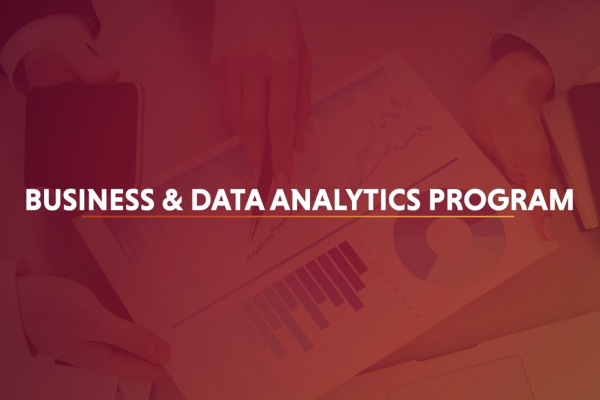
Master of Science in Business Data Analytics
-
Duration
11 months (regular) or 2 years (flexible format)
-
Format
In-Seat
-
Location
Charleston
Program Overview
Business and industry rely on the use of data to predict outcomes, increase growth, and develop strategy. In this program, you’ll learn the skills necessary to navigate the challenges and vast opportunities of a data-driven future.
Our expert faculty will guide you in acquiring in-demand and industry-relevant aptitude, knowledge, and skills, that are required to create value with, manage, and lead business data analytics solutions.
The Master of Science in Business Analytics program at the University of Charleston is designed for professionals seeking to advance their expertise. With an interactive learning environment, real-world case studies, and access to expert faculty, students gain hands-on experience in data visualization, predictive analytics, and business intelligence. Whether you have a background in data science or are transitioning from a non-quantitative field, this program equips you with the analytical skills needed to drive data-informed decision-making in today’s competitive business landscape.


Students must have an undergraduate degree from an accredited institution to be fully admitted to the MSBDA program. Applications will be accepted and reviewed from students who are in their final year of undergraduate study for conditional admission.
Admission preference will be given to students with a 3.0 or higher cumulative GPA in a quantitative degree program (engineering, finance, computer science, mathematics/statistics, etc.). Interested students in non-quantitative degree programs and/or with lower GPAs are encouraged to apply as well.
Students must submit the MSBDA application, official transcripts from all colleges/universities attended, and a professional resume. GRE/GMAT scores are not required but may be submitted in support of the application. Decisions will be made on a rolling basis for each fall semester start.

STEM Optional Practical Training programs are recognized by the U.S. government as beneficial to students and employers. Through these programs, international students gain essential, in-demand skills, and can extend their 12 month OPT an additional 24 months.
Program Highlights
-
The MSBDA Program blends innovative curriculum in data analytics, predictive modeling, management, and business space.
-
Degree qualifies international students for a STEM OPT visa extension following graduation.
-
Opportunities for collaborative work with peers, faculty, and the business community.
-
Most classes and capstone course are designed to provide opportunities to work with real business problems and provide practical solutions/decision making tools for the business.
Courses Included in the Program
- MBDA 700 Business Analytics for Managers: Learn how to interpret and leverage data for strategic decision-making, focusing on real-world business applications and analytics-driven leadership.
- MBDA 710 Big Data: Management & Application: Explore big data principles, storage, processing, and application, gaining hands-on experience with tools for managing large datasets in business environments.
- MBDA 720 Data Visualization & Data Mining: Master techniques for transforming raw data into meaningful visual insights while learning essential data mining methods for extracting patterns and trends.
- MBDA 730 Data, AI, Ethics & Leadership: Examine ethical considerations in AI and data usage while developing leadership skills to navigate complex challenges in business analytics.
- MBDA 740 Data Science Application & Technologies: Gain practical experience with data science tools, frameworks, and methodologies to apply analytics solutions across various business sectors.
- MBDA 750 Predictive Modeling for Business & Data Analytics: Learn predictive modeling techniques, including regression analysis and machine learning, to forecast trends and enhance decision-making.
- MBDA 760 Quantitative Methods for Business & Economics: Apply statistical and mathematical techniques to analyze business and economic data, supporting data-driven strategy and financial forecasting.
- MBDA 770 Machine Learning: Explore machine learning algorithms, from supervised to unsupervised learning, and their application in business analytics for automation and pattern recognition.
- MBDA 780 Business Forecasting for Analytics: Develop forecasting models using historical data and statistical techniques to anticipate market trends and business performance.
- MBDA 790 Business Analytics Capstone: Apply learned concepts in a real-world project, solving complex business problems through data analytics, strategic insights, and predictive modeling.


